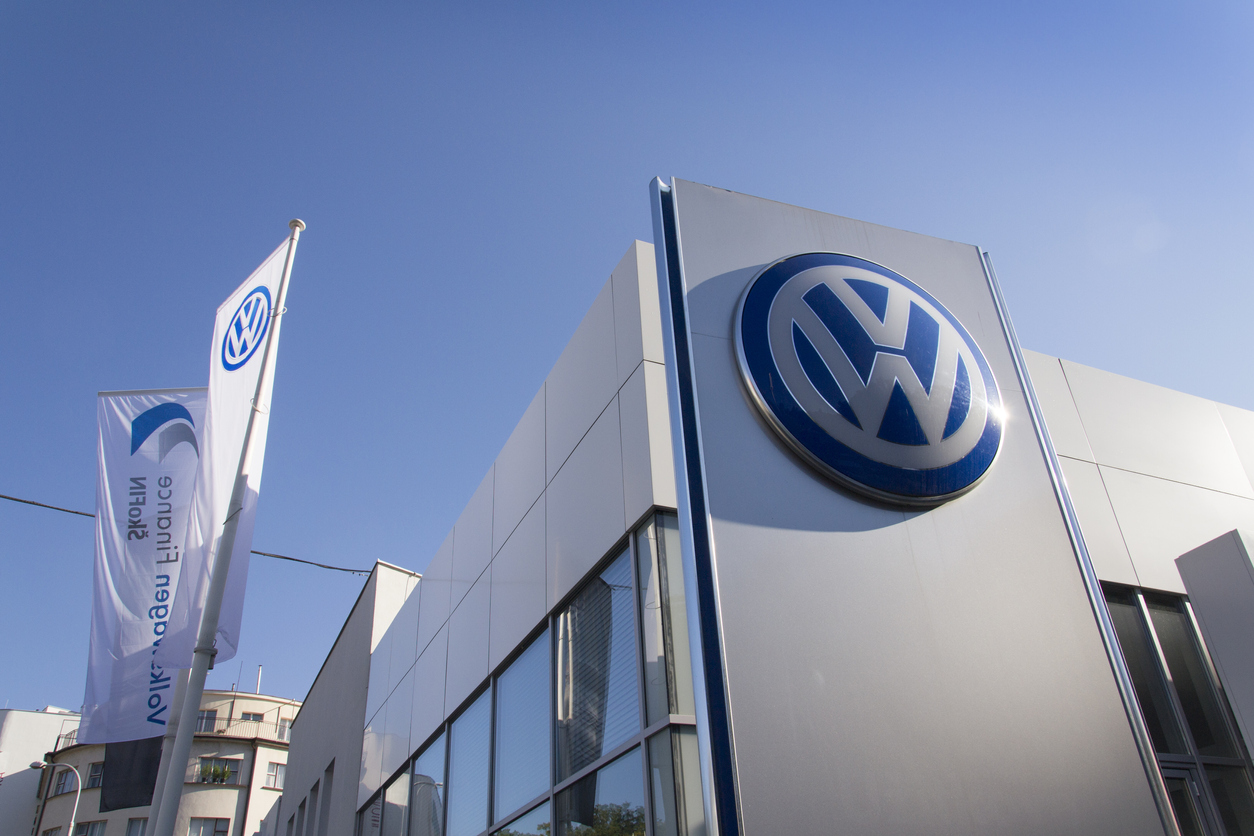Volkswagen and Rivian Join Forces in $5.8 Billion Partnership to Lead the Future of Electric Vehicles
Volkswagen Group (VW) has officially launched a strategic joint venture with electric vehicle (EV) startup Rivian, marking a significant milestone in the automotive sector. The deal, now valued at $5.8 billion (£4.55 billion), represents an expanded commitment from Volkswagen, surpassing the original $5 billion investment pledge. This collaboration comes at a critical time as the global electric vehicle market faces growing competition, slowing demand, and an increasing emphasis on sustainable transportation solutions.
This new partnership brings together two key players in the EV landscape: Volkswagen, Europe’s largest automaker, and Rivian, an American company renowned for its electric trucks and SUVs. The deal is expected to allow both companies to share key technologies, streamline vehicle production, and offer more affordable electric options to consumers. For Rivian, the deal provides much-needed financial support as it prepares to roll out its next-generation R2 model—an electric sports utility vehicle (SUV) designed to attract more budget-conscious buyers. For Volkswagen, the partnership signals a step forward in its ambitious plans to dominate the EV market by integrating Rivian’s advanced technology into its future electric vehicle offerings.
Rivian’s Growing Footprint in the Electric Vehicle Market
Founded in 2009, Rivian has quickly emerged as a prominent player in the electric vehicle space, known for its high-performance trucks and SUVs. The company’s flagship products, the R1T pickup truck and R1S SUV, have captured the attention of adventure and off-road enthusiasts. Rivian’s vehicles are celebrated for their rugged designs, advanced technology, and impressive performance capabilities, making them a standout in the competitive electric vehicle market.
Despite its early success in creating a niche for electric adventure vehicles, Rivian has faced challenges in scaling production and achieving profitability. The company’s ambitious production goals have been tempered by supply chain issues, rising production costs, and the broader market downturn affecting all electric vehicle manufacturers. Nevertheless, Rivian continues to push forward, leveraging strategic partnerships like this joint venture with Volkswagen to strengthen its position in the industry.
The new $5.8 billion agreement will be pivotal for Rivian as it prepares for the launch of its R2 model, which is expected to be smaller and more affordable than its current lineup. The R2 is seen as a crucial product for Rivian as it looks to tap into the growing demand for budget-friendly electric vehicles. By collaborating with Volkswagen, Rivian can access the German automaker’s vast manufacturing expertise and global supply chain, helping it reduce costs and speed up production.
Volkswagen’s Strategy to Accelerate Its EV Transition
Volkswagen’s partnership with Rivian comes as the company is doubling down on its efforts to lead the electric vehicle revolution. As Europe’s largest automaker, VW has made bold commitments to phase out gasoline and diesel vehicles in favor of electric models. The company is working to reduce its carbon footprint and is investing heavily in sustainable technologies as part of its broader vision to become a key player in the global EV market.
VW’s strategy focuses on the development of electric powertrains, battery systems, and autonomous driving technologies, with an eye toward increasing market share in the growing global EV market. The partnership with Rivian allows Volkswagen to benefit from the startup’s cutting-edge electric vehicle technologies, such as its electric powertrains and battery systems. In return, Rivian gains access to Volkswagen’s extensive manufacturing network, which could help the smaller company ramp up production and reduce costs. The first vehicles incorporating Rivian’s technology into Volkswagen’s lineup are expected to hit the market as early as 2027, showcasing the long-term nature of this partnership.
This joint venture will also see both companies share valuable engineering and software development resources, with engineers and software developers from both sides working together at a new facility in California. The collaboration is expected to accelerate the development of new technologies, reduce development costs, and enable both companies to produce more affordable electric vehicles. The success of this partnership could serve as a model for future collaborations within the automotive industry, where resource sharing and joint technological advancements are becoming increasingly important.
Rivian’s Role in the Commercial EV Market
In addition to passenger vehicles, Rivian has made a significant mark in the commercial electric vehicle sector, especially with its electric delivery vans. The company has secured a major contract with Amazon, its largest shareholder, to supply 100,000 electric delivery vans, which are expected to be delivered by the end of the decade. This partnership positions Rivian as a leader in the electric commercial vehicle space, with growing interest from logistics companies looking to reduce emissions and meet sustainability goals.
Rivian’s electric vans have already begun making their way into Amazon’s fleet, with the e-commerce giant praising their performance and environmental impact. The partnership with Amazon is expected to provide Rivian with a steady revenue stream and further enhance its brand as a pioneer in the electric vehicle market. With support from Volkswagen, Rivian will have the resources and infrastructure to scale its commercial electric vehicle operations, providing fleets with sustainable alternatives to traditional delivery trucks.
Challenges in the Electric Vehicle Market
The electric vehicle industry is facing a number of challenges as demand has slowed in certain regions and global supply chains continue to be disrupted. The rising cost of raw materials, such as lithium and nickel, has placed pressure on battery manufacturers, while production delays and logistical hurdles have impacted vehicle deliveries. Additionally, the competition among EV manufacturers, including well-established automakers like Ford, General Motors, and Volkswagen, as well as startups like Rivian, is intensifying.
The growing presence of Chinese electric vehicle manufacturers, such as BYD and Nio, has added another layer of competition, particularly in Europe and Asia. These companies are producing electric vehicles at competitive prices, making it more difficult for Western automakers to maintain their market share. In response to this, Volkswagen has been focusing on reducing costs and improving production efficiency, which is where its partnership with Rivian comes in. By sharing resources and expertise, both companies hope to reduce the risks associated with the transition to electric mobility.
Related: Tesla Cybertruck Becomes Futuristic Police Vehicle with UP.FIT Customizations for Law Enforcement
What the Future Holds for Volkswagen and Rivian
The Volkswagen-Rivian partnership represents a major step forward in the race to dominate the global electric vehicle market. As the industry faces growing competition, economic pressures, and technological challenges, collaboration between established automakers and new players like Rivian will be crucial to pushing the boundaries of innovation and expanding the adoption of electric vehicles.
The first models equipped with Rivian’s technology are expected to launch in 2027, marking a significant moment for both companies. The collaboration will allow Volkswagen to tap into new customer segments, including those interested in more affordable electric SUVs, while providing Rivian with the resources and scale to reach a wider audience. Together, Volkswagen and Rivian will have the opportunity to play a major role in shaping the future of electric mobility.
As both companies continue to innovate and expand their electric vehicle portfolios, the joint venture is poised to make a lasting impact on the industry. With a combined focus on reducing costs, enhancing production efficiency, and developing cutting-edge technologies, Volkswagen and Rivian are well-positioned to meet the growing global demand for sustainable transportation.











